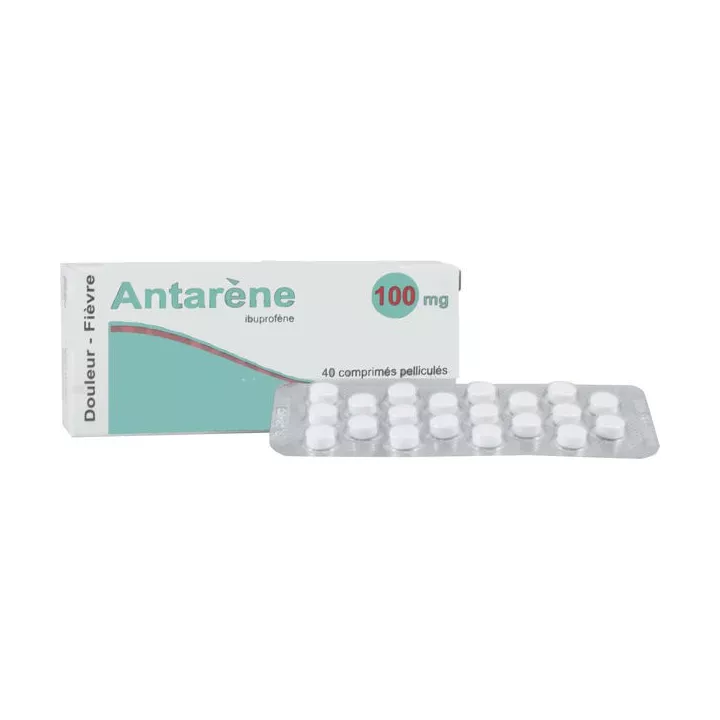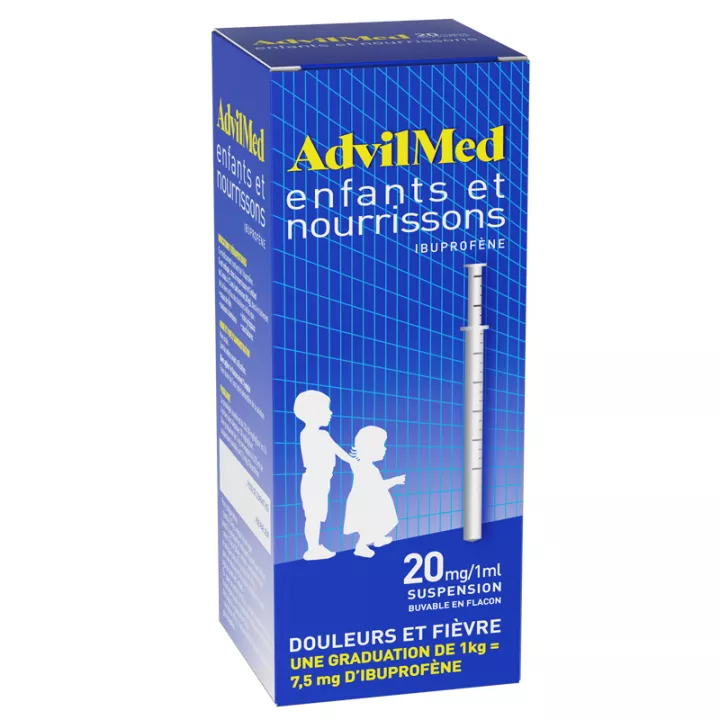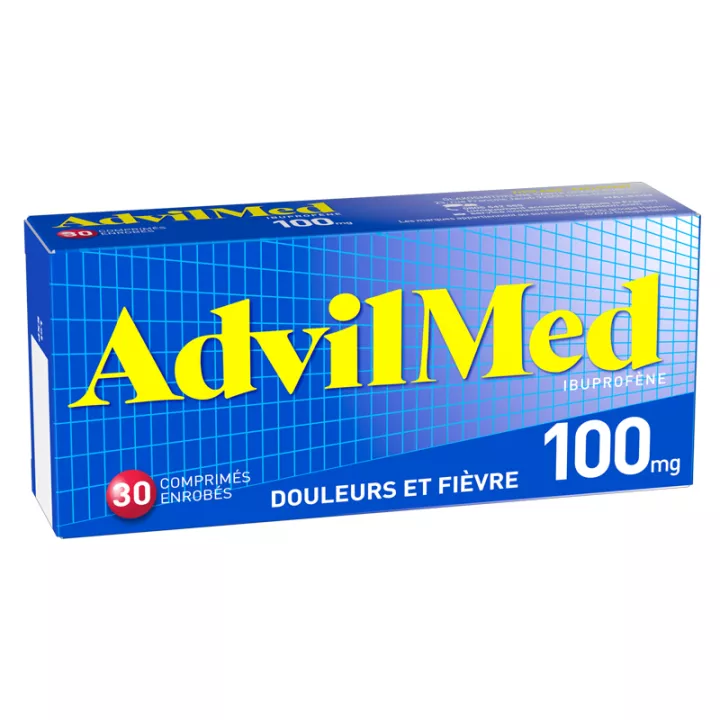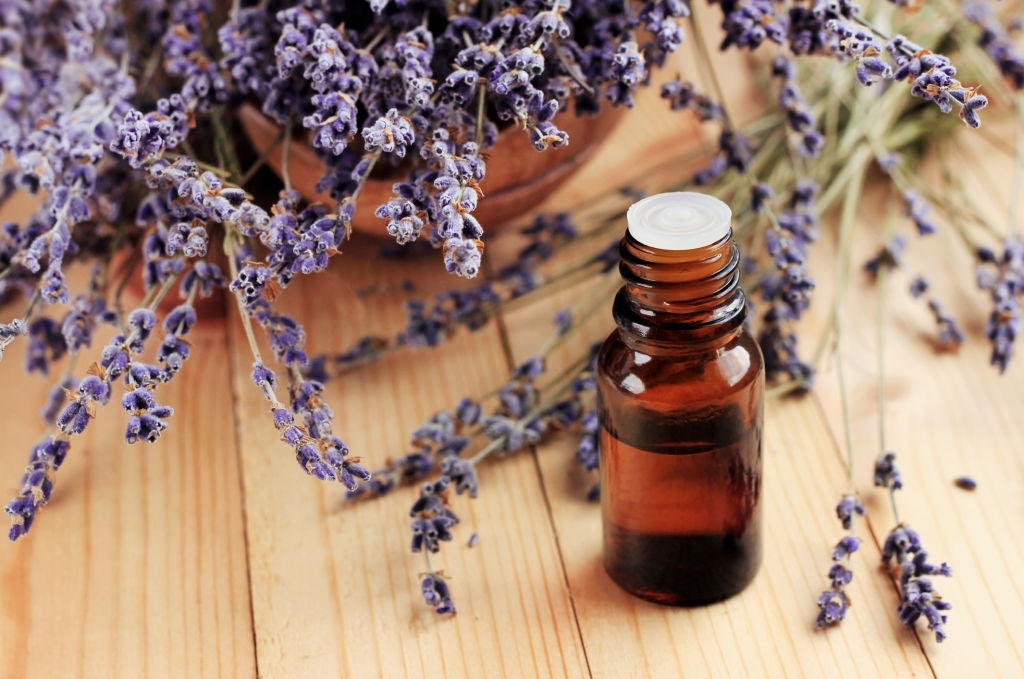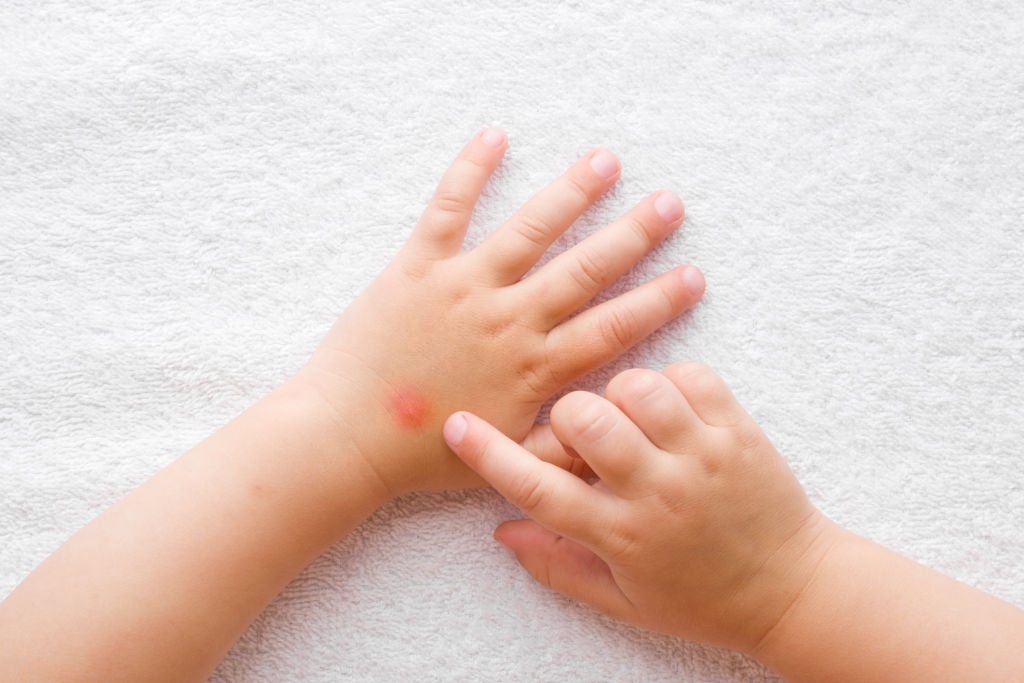NOTICE
ANSM - Last updated: 12/04/2011
Name of the medicinal product
ANTARENE 100 mg film-coated tablet
Ibuprofen
framed
Read this leaflet carefully before you start using this medicine. It contains important information for your treatment.
· This medication can be used in self-medication, ie used without consultation or prescription from a doctor.
· If symptoms persist, worsen or new symptoms appear, seek advice from your pharmacist or doctor.
· This leaflet is designed to help you use this medicine. Keep it, you may need to reread it.
DO NOT LEAVE THIS MEDICINE FOR CHILDREN.
Review summary
In this notice :
1. WHAT IS ANTARENE 100 mg film-coated tablet AND WHAT IT IS USED FOR?
2. BEFORE YOU TAKE ANTARENE 100 mg film-coated tablet?
3. HOW TO TAKE ANTARENE 100 mg film-coated tablet?
4. WHAT ARE POSSIBLE SIDE EFFECTS?
5. HOW TO STORE ANTARENE 100 mg film-coated tablet?
6. ADDITIONAL INFORMATION
1. WHAT IS ANTARENE 100 mg film-coated tablet AND WHAT IT IS USED FOR?
Pharmacotherapeutic group
OTHER ANALGESICS AND ANTIPYRETICS.
Therapeutic indications
This medicine contains a non-steroidal anti-inflammatory drug: ibuprofen. It is indicated in children from 20 kg to 30 kg (about 6 years to 11-12 years) in:
· short-term treatment of fever and / or pain such as headaches, flu-like conditions, dental pain, aching and painful periods;
· chronic juvenile arthritis.
2. BEFORE YOU TAKE ANTARENE 100 mg film-coated tablet?
List of information needed before taking the medication
If your doctor has told you about an intolerance to some sugars, contact your doctor before taking this medicine.
Cons-indications
Do not take ANTARENE 100 mg film-coated tablets in the following cases:
· after 5 months of pregnancy (24 weeks of amenorrhea),
· a history of allergy or asthma triggered by the use of this drug or a related drug, including other non-steroidal anti-inflammatory drugs, acetylsalicylic acid (aspirin),
· antecedent allergy to the other constituents of the tablet,
· history of gastrointestinal bleeding or ulcers associated with previous NSAID treatments,
· ulceration or bleeding of the stomach or intestine in progress or recurrence,
· gastrointestinal haemorrhage, cerebral hemorrhage or other ongoing hemorrhage,
· severe liver disease,
· severe kidney disease,
· serious heart disease,
· systemic lupus erythematosus,
· child under 6 years old because it can swallow and choke.
IN CASE OF DOUBT, IT IS ESSENTIAL TO ASK FOR THE OPINION OF YOUR DOCTOR OR YOUR PHARMACIST.
Precautions for use; special warnings
Take special care with ANTARENE 100 mg film-coated tablet:
In high doses, greater than 1200 mg / day, this drug has anti-inflammatory properties and can cause serious disadvantages that are observed with non-steroidal anti-inflammatory drugs.
Drugs such as eryarenes 100 mg film-coated tablets may increase the risk of heart attack ("myocardial infarction") or stroke. The higher the doses prolonged treatment.
Do not exceed recommended dosage or treatment time.
If you have heart problems, have had a stroke, or if you think you have risk factors for this type of illness (eg high blood pressure, diabetes, high cholesterol, or please contact your doctor or pharmacist.
Special warnings
If you are a woman, ANTARENE 100 mg film-coated tablet can alter your fertility. Its use is not recommended in women who wish to conceive a child. In women with reproductive difficulties or in whom breast function tests are ongoing, please tell your doctor or pharmacist before taking ANTARENE 100 mg film-coated tablets.
Elderly patients have a higher risk of adverse effects, particularly for gastrointestinal haemorrhage, ulcers and perforations. Renal, hepatic and cardiac functions should be closely monitored. The dosage should be as low as possible for the shortest time needed to relieve symptoms.
The use of this medication is not recommended in patients with galactose intolerance, Lapp lactase deficiency or glucose or galactose malabsorption syndrome (rare hereditary diseases).
BEFORE YOU USE THIS MEDICINE, CONSULT YOUR DOCTOR IN CASE:
· a history of asthma associated with chronic rhinitis, chronic sinusitis or polyps in the nose. Administration of this specialty may lead to an asthma attack, particularly in patients who are allergic to acetylsalicylic acid (aspirin) or to a non-steroidal anti-inflammatory drug ( see section "Never take ANTARENE 100 mg film-coated tablets following cases " ),
· coagulation disorders, and anticoagulant therapy. This medication may cause severe gastrointestinal symptoms,
· digestive antecedents (hiatal hernia, digestive hemorrhage, old stomach or duodenal ulcer),
· heart disease, liver or kidney disease,
· of varicella. This medication is not recommended because of exceptional severe infections of the skin,
· concomitant treatment with other drugs that increase the risk of peptic ulcer or haemorrhage, eg, oral corticosteroids, antidepressants (SSRIs, ie, Selective Serotonin Recapture Inhibitors), medicines preventing the formation of blood clots such as aspirin or anticoagulants such as warfarin. If you are in any of these conditions, talk to your doctor before taking ANTARENE 100 mg film-coated tablets ( see section "Take or use other medicines" ),
· concomitant therapy with methotrexate at doses greater than 20 mg per week or with pemetrexed ( see section "Take or use other medicinal products" ).
DURING TREATMENT, IN CASE OF:
· of vision problems, PREVENT YOUR DOCTOR,
· gastrointestinal haemorrhage (discharge from the mouth or stool, stool coloration in black), STOP TREATMENT AND IMMEDIATELY CONTACT AN EMERGENCY MEDICAL OR MEDICAL SERVICE,
· of appearances of cutaneous or mucosal signs that resemble a burn (redness with bubbles or blisters, ulcerations), STOP THE TREATMENT AND CONTACT IMMEDIATELY A DOCTOR OR AN EMERGENCY MEDICAL SERVICE,
· of allergy-related signs including asthma attack or sudden swelling of the face and neck ( see section "What are the possible side effects?" ), STOP TREATMENT AND CONTACT IMMEDIATELY A DOCTOR OR A MEDICAL SERVICE EMERGENCY.
This medicine contains a non-steroidal anti-inflammatory drug: ibuprofen . You should not take other medicines containing non-steroidal anti-inflammatory drugs (including selective cyclooxygenase 2 inhibitors) and / or acetylsalicylic acid (aspirin) at the same time as this medication. Read carefully the instructions for other medicines you are taking to ensure that there are no nonsteroidal anti-inflammatory drugs and / or acetylsalicylic acid (aspirin). |
Interaction with other medicines
Taking or using other medicines:
PLEASE INDICATE YOUR DOCTOR OR YOUR PHARMACIST IF YOU TAKE OR RECENTLY TAKE ANY OTHER MEDICINE, EVEN IF ANY MEDICINE IS OBTAINED WITHOUT ORDER.
CERTAIN MEDICINAL PRODUCTS MAY NOT BE USED AT THE SAME TIME, WHILE OTHER MEDICINES REQUIRE SPECIFIC CHANGES (DOSE, FOR EXAMPLE).
Always inform your doctor, dentist or pharmacist if you are taking any of the following medicines in addition to ANTARENE 100 mg film-coated tablet:
· aspirin (acetylsalicylic acid) or other non-steroidal anti-inflammatory drugs
· corticosteroids
· oral anticoagulants such as warfarin, injectable heparin, antiplatelet agents or other thrombolytics such as ticlopidine
· lithium
· methotrexate
· angiotensin converting enzyme inhibitors, diuretics, beta-blockers and angiotensin II antagonists
· some antidepressants (selective serotonin reuptake inhibitors)
· pemetrexed
· ciclosporin, tacrolimus.
Interactions with food and beverages
Not applicable.
Interactions with Herbal Medicines or Alternative Therapies
Not applicable.
Use during pregnancy and lactation
Pregnancy and breast feeding
This medication is for the child. However, when used in exceptional circumstances in women of childbearing age who may be pregnant, the following must be recalled:
ASK YOUR DOCTOR OR YOUR PHARMACIST BEFORE TAKING ALL MEDICINAL PRODUCTS.
Pregnancy
During the first trimester of pregnancy (12 weeks of amenorrhoea, 12 weeks after the first day of your last menstrual period), your doctor may prescribe this medication if necessary.
For 2.5 to 5 months of pregnancy (12 to 24 weeks of amenorrhea), this medication will only be used on the advice of your doctor and in brief dosage. Prolonged use of this medication is strongly discouraged.
After 5 months of pregnancy (beyond 24 weeks of amenorrhea), you should NOT take this medication because its effects on your child can have serious consequences, especially on a cardiopulmonary level and renal, even with a single dose.
If you are taking this medication when you are more than five months pregnant, please speak to your obstetrician gynecologist for appropriate monitoring.
feeding
This drug passes into breast milk. As a precaution, it should be avoided during breastfeeding.
Sport
Not applicable.
Effects on ability to drive or use machines
Driving and using machines
In rare cases, taking this medicine may cause dizziness and blurred vision.
List of excipients with known effect
Important information about some of the ingredients of ANTARENE 100 mg film-coated tablet:
This medicine contains lactose.
3. HOW TO TAKE ANTARENE 100 mg film-coated tablet?
Instructions for proper use
The occurrence of adverse reactions can be minimized by using the lowest possible dose for the shortest duration necessary to alleviate the symptoms.
Dosage, Mode and / or route (s) of administration, Frequency of administration and Duration of treatment
Dosage
ADAPTED TO THE CHILD FROM 20 KG TO 30 KG (approximately 6 to 11-12 years).
Painful and / or febrile conditions
In children, the usual dosage is 20 to 30 mg / kg / day in 3 doses per day (not to exceed 30 mg / kg / day).
In children from 20 to 30 kg (approximately 6 to 11 years): 2 tablets (200 mg), to be renewed if necessary after 6 hours. In all cases, do not exceed 6 tablets per day (600 mg).
In children over 30 kg (approximately 11-12 years): there are more suitable dosages.
The elderly with an increased risk of adverse effects should use the lowest possible dose for the shortest time necessary to relieve symptoms.
Do not exceed the recommended doses or the duration of treatment (3 days in case of fever, 5 days in case of pain).
Chronic Juvenile Arthritis
The usual dosage is 30 to 40 mg / kg / day in 4 doses per day.
Method and route of administration
Oral use.
Swallow the tablet without chewing it with a large glass of water.
The tablets should be taken preferably during a meal.
Frequency of Administration
Systematic catches help to avoid oscillations of pain or fever.
They should be spaced at least 6 hours.
Duration of treatment
The duration of use is limited to: · 3 days in case of fever, · 5 days in case of pain. |
If the pain persists more than 5 days or the fever more than 3 days , or if they worsen or in the event of another disorder, inform your doctor.
If you feel that the effect of ANTARENE 100 mg film-coated tablets is too strong or too weak, talk to your doctor or pharmacist.
Symptoms and Instructions for Overdose
If you take more ANTARENE 100 mg film-coated tablets than you should:
In case of accidental overdose or poisoning, STOP TREATMENT AND QUICKLY CONSULT A DOCTOR .
Instructions for omission of one or more doses
If you forget to take ANTARENE 100 mg film-coated tablets: do not take a double dose to make up for the single dose you have forgotten to take.
Risk of withdrawal syndrome
Not applicable.
4. WHAT ARE POSSIBLE SIDE EFFECTS?
Description of adverse reactions
Like all medicines, ANTARENE 100 mg film-coated tablets are likely to have side effects, although not everybody gets them.
Drugs such as eryarenes 100 mg film-coated tablets may increase the risk of heart attack (myocardial infarction) or stroke.
May cause allergic reactions:
· rash: rash on the skin, itching, edema, aggravation of chronic urticaria,
· respiratory, asthma crisis,
· generalized: abrupt swelling of the face and neck with respiratory discomfort (angioedema).
In rare cases, gastrointestinal hemorrhage may occur ( see section "Take special precautions with ANTARENE 100 mg film-coated tablets" ). This is all the more frequent when the dosage used is high.
Exceptionally, there may be headaches accompanied by nausea, vomiting and neck stiffness.
Very rarely, bullous manifestations of the skin or mucous membranes (burning sensation accompanied by redness with bubbles, blisters, ulcerations) may occur.
Exceptionally, severe skin infections have been observed in cases of chicken pox.
In all these cases, you should stop treatment immediately and notify your doctor .
During treatment, there may be:
· digestive disorders: stomach upset, vomiting, nausea, diarrhea, constipation,
· dizziness, headache, rare visual disturbances, significant decrease in urine, renal insufficiency.
In all these cases, you should tell your doctor.
Exceptionally, there have been changes in liver function or blood counts (decreased white blood cells or red blood cells) that may be severe.
If you notice any side effects not listed in this leaflet, or if any of the side effects gets serious, contact your doctor or pharmacist.
5. HOW TO STORE ANTARENE 100 mg film-coated tablet?
Keep out of the reach and sight of children.
Expiration date
Do not use ANTARENE 100 mg film-coated tablets after the expiry date which is stated on the carton.
Storage conditions
No special storage conditions.
If necessary, warnings against visible signs of deterioration
Medicines should not be disposed of via wastewater or household waste. Ask your pharmacist what to do with unused medications. These measures will help protect the environment.
6. ADDITIONAL INFORMATION
Full list of active substances and excipients
What does ANTARENE 100 mg contain, film-coated tablets?
The active substance is:
Ibuprofen ................................................. .................................................. ..................................... 100 mg
For 1 film-coated tablet.
The other components are: corn starch, anhydrous colloidal silica, pregelatinized starch, stearic acid, OPADRY white OYL 28900 (titanium dioxide, hypromellose, lactose monohydrate, macrogol 4000) and carnauba wax
Pharmaceutical form and content
What is ANTARENE 100 mg film-coated tablets and contents of the pack?
This drug is in the form of film-coated tablet.
Box of 30 or 40.
Name and address of the marketing authorization holder and the holder of the manufacturing authorization responsible for the release of the lots, if different
Holder
LABORATORY OF ELERT THERAPEUTIC ACHIEVEMENTS
181 - 183, ANDRE KARMAN STREET
BP 101
93303 AUBERVILLIERS CEDEX
exploiting
LABORATORIES OF ELERT THERAPEUTIC ACHIEVEMENTS
181-183, ANDRE KARMAN STREET
BP 101
93303 AUBERVILLIERS CEDEX
Maker
SOPHARTEX LABORATORIES
21, RUE DU PRESSOIR
28500 VERNOUILLET
Names of the medicinal product in the Member States of the European Economic Area
Not applicable.
Date of approval of the notice
The last date on which this leaflet was approved is {date}.
AMM under exceptional circumstances
Not applicable.
Internet Information
Detailed information on this medicine is available on the Afssaps website (France).
Information for health professionals only
Not applicable.
Other
ADVICE / HEALTH EDUCATION
"WHAT TO DO IN THE EVENT OF FEVER":
The normal temperature of the body is variable from one individual to another and between 36.5 ° C and 37.5 ° C. An increase of more than 0.8 ° C is considered a fever.
In children between 20 and 30 kg (about 6 years to 11-12 years) : if the disorder is too troublesome, you can take a medicine containing ibuprofen at the indicated dosage.
With this medication, the fever should drop rapidly. Nevertheless :
· if other signs appear (such as a rash),
· if the fever persists for more than 3 days or if it worsens,
· if the headache becomes violent, or in case of vomiting,
CONSULT YOUR DOCTOR IMMEDIATELY.
"WHAT TO DO IN CASE OF PAIN":
· In the absence of improvement after 5 days of treatment,
· If the pain returns regularly,
· If accompanied by fever,
· If she wakes you up at night,
CONSULT YOUR DOCTOR IMMEDIATELY.

